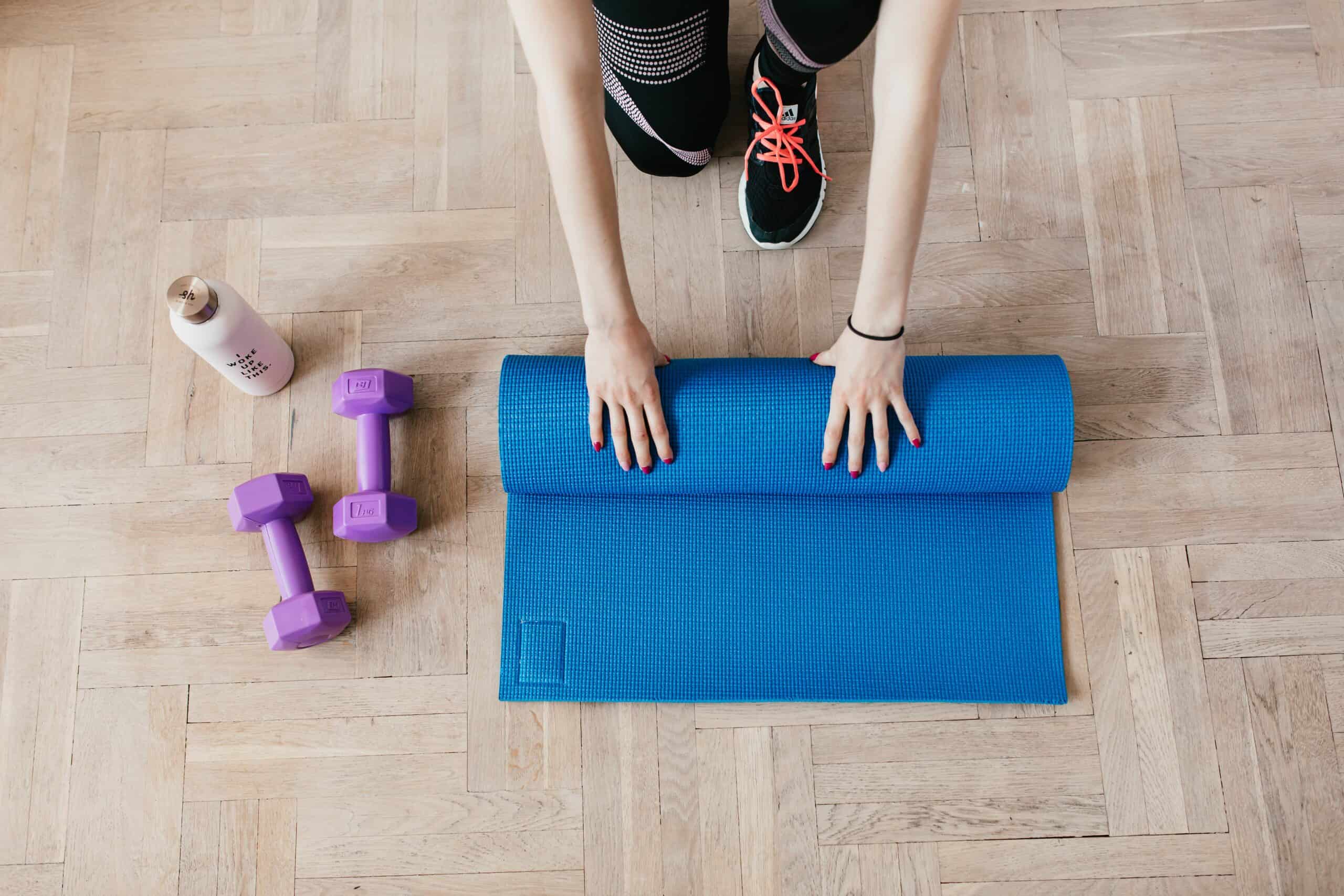As you approach your 40s and 50s, you may be feeling that weight loss is not as easy as it used to be. At midlife, our midriff isn’t as lean as it once was.
You may be wondering what you need to know, and what you need to adjust in order to keep up with your health goals in this new era. As a Registered Dietitian who works with thousands of women in their 40s and 50s, I will walk you through the changes you’re experiencing, and how to adjust your weight loss agenda according to your new normal.
Hormone Changes
Most women sense a shift around their 40th birthday. After decades in our adult bodies, we feel like moody teenagers again. Hormones are having a hay day, and they’re leaving us moody, sweaty, sleepy, and heavy.
Seven specific hormones are largely to blame.
Estrogen & Progesterone
Many women start noticing perimenopausal symptoms in their 40s. Gradually, during this time, the estrogen-producing follicles in her ovaries reduce, and estrogen and progesterone begin to decline. When she reaches menopause (the day when she reaches 12 months without a period), these hormones drop even further.
Testosterone
Testosterone plays many important roles in a woman’s body. This hormone is critical for energy levels, muscle mass and fat distribution, metabolism, and sexual satisfaction. During perimenopause, however, testosterone levels drop. By a woman’s mid-50s, her testosterone levels will likely fall by about 50%.
Cortisol
Cortisol, our stress hormone, can also become imbalanced during perimenopause. This hormone regulates a wide range of vital processes in our bodies, like our metabolism, mental function, immune responses, and stress levels. Cortisol levels are often elevated while we’re experiencing perimenopause and menopause, sometimes making symptoms much harder.
Insulin
The hormone, insulin, effects many on other hormones in the body, including the sex hormones, estrogen, progesterone, and testosterone, which are already imbalanced during pre-menopause. Insulin imbalances can sneak in during menopause unnoticed. Insulin resistance can lurk beneath two of the most common symptoms women experience during menopause: fatigue and weight gain.
Ghrelin & Leptin
During perimenopause, levels of the hunger-stimulating hormone ghrelin increase, causing many women to feel hungry frequently. Levels of the hormone leptin, which promotes a sense of fullness, reduce throughout peri and post-menopause.
Why Midlife Weight Gain Matters
Wait gain doesn’t diminish your value as a person, what you offer, your beauty, or your importance. But it can rob you of a long and healthy life.
Typically, during menopause, women gain weight in their bellies. This type of weight gain increases the risk of diabetes, heart disease, high blood pressure, stroke, and respiratory problems. Extra weight on our joints can also lead to arthritis that limits our mobility and makes it harder to exercise.
Feeling like yourself and confident in your body matters. But there’s more at stake than looking slim, and many of us are approaching menopausal weight gain all wrong.
When Cutting Calories and Crushing Cardio Aren’t Working
Putting on weight around our middle can be one of the most frustrating midlife symptoms, and it can happen suddenly too. We turn to our tried-and-trusted ways of shifting the pounds only to discover that they don’t work anymore!
What’s going on? The hormonal roadblocks listed above are often why we struggle to lose this new belly fat regardless of how many calories we cut and cardio we complete. Often, we can make our hormones more imbalanced. We can increase cortisol with too much cardio and promote insulin imbalances by eating too little.
Thankfully, with hormones in mind, there’s plenty that you can do to soothe midlife symptoms and control your body weight in your 40s and 50s!
Here are steps you can take this week that will help:
Shift Your Diet for a Full-Body Boost
You’ve probably heard people buzzing about intermittent fasting, and that’s because it really works. Fasting overnight for 12-14 hours helps us break the habit of late-night snacking, which can lead to weight gain. But it also does a bit of magic we especially need during menopause.
Eating within a set schedule gives your digestive system the time it needs to normalize your blood sugar. Intermittent fasting also increases your insulin sensitivity, metabolism, and fat-burning. While stress and sleep issues increase during menopause, intermittent fasting can improve your mental concentration and increase your energy levels.
New to intermittent fasting? Start here—I’ll teach you the do’s and don’ts of intermittent fasting for healthy weight loss.
Workout This Way for Easier Weight Loss
In our 40s and 50s, we begin battling hormone imbalance and sarcopenia (age-related muscle loss). One exercise in particular becomes more and more important for us ladies as we age: strength training.
Lifting weights boosts metabolism, increases bone density, and improves our cardiovascular system. In days, strength training can decrease stress and boost your mood, a welcome relief when hormones are having a hay day.
If you’re new to weight lifting, start with body or low-weight exercises, like these. Then slowly increase your weights as you grow stronger.
Self-Soothe With Healing Habits
Remember when your kids were toddlers? They would break down in an emotional outburst, crying out for the toy or treat they wanted. As the mom, you knew that they were actually exhausted and needed a nap, or overwhelmed and needed a breath of fresh air.
We misdiagnose what we need all the time. Like the toddler, all we feel is our overwhelming symptom and we try to soothe ourselves with whatever brings quick relief.
When we’re tired, we’re more likely to grab another cup of coffee than go to bed an hour earlier. When we’re hungry, we reach for the high-carb snack we’re craving rather than making ourselves a substantial and nutritious meal.
Try to tap into the deeper need and meet yourself there. When you feel your body crying out with a need, don’t shush it up with a quick fix. Make a list of healthy habits you love that will actually bring lasting relief. Here are a few ideas:
When I feel anxious, instead of eating a high-sugar and carby snack, I will:
- Leave my phone at home and take a 10-minute walk outside to feel rejuvenated
- Make myself a comforting anti-anxiety latte
- Sit on the front porch and take 30 slow breaths
- Call someone who loves me
When I feel tired, instead of drinking more coffee and risking disrupting my sleep later, I will:
- Try a drink with less caffeine, like matcha which won’t increase cortisol as much as coffee can
- Run/walk a mile outside—research shows this wakes us up better than coffee!
- Follow this routine to get a much better night’s sleep tonight
When I feel insecure about my midlife weight gain, instead of punishing myself with criticism, cardio, and calorie cuts, I will:
- Eat healthy, healing meals (within an 8-hour window, if I want to try intermittent fasting) with plenty of plants and protein.
- Complete a workout I enjoy—like strength training, yoga, or walking with a friend.
- Sign up for an active hobby I’ll love, like a garden club, a cycling group, or a dance class
- Foster love for my body (it’s much more than something to look at and works hard for you every day!) with a massage, a bath, or stretching.
How to Slow the Clock
Aging is inevitable, but you can take steps to look and feel amazing decade after decade. Check out my workout guide for women in their 40s and 50s for more healthy habits that will improve your present and transform your future.





